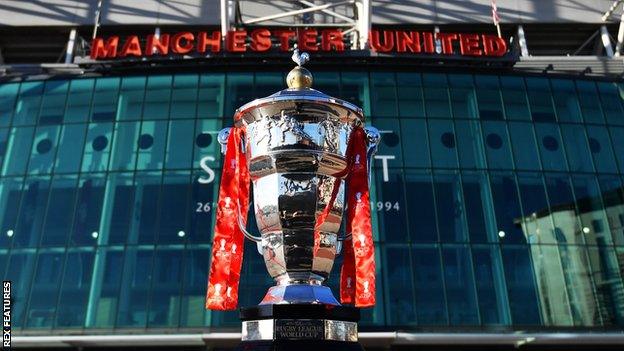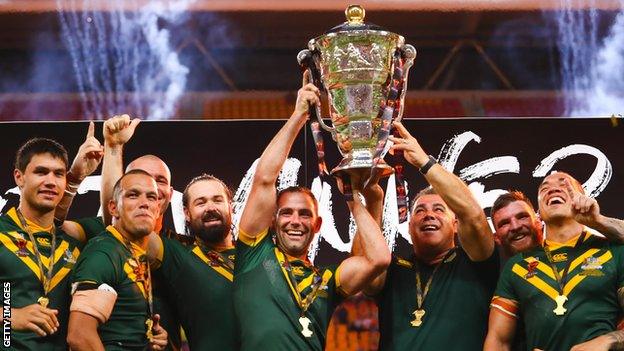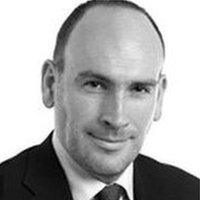Rugby League World Cup: Why the 2021 tournament is different
- Published

Old Trafford will host the men's and women's finals
Rugby League World Cup 2021 draw |
|---|
Venue: Buckingham Palace, London Date: Thursday, 16 January, 12:00 GMT Coverage: Live streaming and text coverage on BBC Sport website and app from 11:45 GMT |
It is fair to assume that organisers of the 2021 Rugby League World Cup cannot quite believe their luck.
With the Duke of Sussex, Prince Harry, conducting the tournament's first ever public draw at Buckingham Palace on Thursday in his first engagement since the shock announcement that he and his wife the Duchess of Sussex, Meghan Markle, are to step back from royal duties, the eyes of the world will be on proceedings in a way no-one could have anticipated at the turn of the year.
Certainly by the end of this week, many more people beyond the sport's fanbase will be aware of the fact that England is hosting the tournament next year.
But it is notable for many more reasons than just the involvement at the draw of the Rugby Football League (RFL) patron.
With the men's, women's and wheelchair rugby league World Cups being staged together and simultaneously for the first time, the tournament is set to be one of the most inclusive, diverse and ground-breaking sporting events ever staged in Britain.
In another first for the tournament, women and wheelchair athletes will benefit from prize-money and pay, and their participation fees will be equal to those that their male counterparts receive. There will also be parity in training facilities, accommodation and travel arrangements. The men's and women's finals will take place as a double-header at Old Trafford, while Arsenal's Emirates will host a sport other than football for the first time.
With renewed political focus on the north of England, most of the matches, including all three finals, will be held in the sport's heartland, in northern towns and cities.
For some, this may risk reinforcing the perception that the sport has always battled with - that it is largely a northern, working-class pursuit - but organisers are vowing to harness digital media to build excitement over the next year and reach younger family audiences behind the traditional hardcore fanbase.
"Our very first conversation with central government way back in November 2015 was around the part the sport could play in the 'Northern Powerhouse'," says Jon Dutton, the tournament's chief executive.
"While around 80% of the 61 games will be staged in the north we want this to be an event enjoyed by the nation.
"We are excited by the opportunity to showcase a major global sporting event in 'the new North' with some of the most vibrant, contemporary, cool, productive and diverse towns and cities in the UK such as Newcastle, Liverpool, Manchester, Leeds, York, Sheffield and Hull. That will have a huge focus for us."
This all comes at a time when the RFL says it is developing strong proposals for a 'Hub for Skills and Social Mobility' through the sport, which would support all the core communities served by clubs and their foundations.
According to a RFL spokesman, it has "highlighted to the Government the significant role made by Rugby League in its core communities in helping address the skills gap which is central to the economic rebalancing of the North."
"The sport has a strong commitment to acting as an enabler for social benefit and improving life chances.
"Half of all Rugby League played is in areas in the top quartile of deprivation. The RFL's discussions with political leaders centre on the need to innovate and find new ways to provide young people in the North with the skills and experience they need to succeed - using sport as the way to inspire."
Just as with last year's road cycling world championships in Yorkshire, when £15m of the event's overall funding was ring-fenced for community projects, a similar model is being applied - £10m of the World Cup's £25m budget is being channelled directly to grassroots facilities.
That is important of course for a sport that has seen participation numbers and Super League attendances dwindle in recent years, and is desperate to use the event as a springboard to attract much-needed new fans, and spark attention in the mainstream media.
"We want to use the tournament to make a positive impact on peoples live," says Dutton. "We want to measure social benefit in local communities and make a case for investment into major sporting events that are measured in a different way."

Australia beat England to win the 2017 final
Free-to-air television coverage and more viewer-friendly kick-off times than the last World Cup in Australia will also help with engagement, especially if the hosts can go one better than they did in 2017, when England narrowly lost to Australia in the final, and win it for the first time.
After Great Britain's recent shambolic southern hemisphere tour when they suffered defeats to a Tonga Invitational side and Papua New Guinea in a 4-0 whitewash, expectations have taken a hit.
And other challenges still remain.
Organisers need to shift 750,000 tickets compared to in 2013 when England co-hosted with Wales, Ireland and France, and the target was just 500,000. The pressure will be on to avoid the sight of empty stands at some of the less glamorous fixtures.
Thirty two teams have to be planned and catered for, and there has been some anger that the rugby league hotbed of Wigan has not been chosen to host matches.
But from the arrival of the newly promoted Toronto Wolfpack into this season's Super League and the franchise's superstar singing Sonny Bill Williams, to the first three-Test Ashes series against Australia for 17 years staged here in the autumn, and the building of a brand new national rugby league centre in Manchester, 2020 is set to be an exciting year for the sport.
The hope that it helps pave the way for a World Cup that the sport is relying on to provide a timely boost and a lasting legacy. And which will enjoy the first proper milestone of its countdown in front of an intrigued global audience at Buckingham Palace on Thursday.
